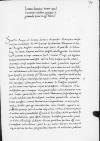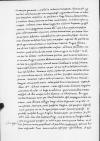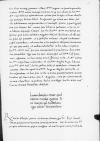Praecipua causa, cur sine creditivis reverendissimum dominum ⌊cardinalem Eboracensem⌋ et serenissimum ⌊regem Angliae⌋ accedere ausi, fuit, ut quid ⌊ille de Schenberg⌋ hic tanto tempore molitus fuisset, intelligerem. Ex ⌊domino cardinali⌋ parum accepi, omnia a ⌊serenissimo domino rege⌋, qui ingenue, postquam me seorsum audisset, mihi in hunc sensum cuncta retulit. In primis, ut est profecto bene doctus, dixit, quod non bene loqueretur Latine, scribere quidem posset aliquid, quia usum dicendi non haberet, nihilominus velit dare operam, et „Enitar”, inquit, „quod me intelligetis. Quae dixistis pro ⌊domino vestro⌋, libenter audivi, cupiebam dudum in hac causa ab aliquo vestrarum partium reddi certior, nihil ego umquam audivi diversius, quam quod vos et ⌊nuntius⌋ de ⌊Prussia⌋ proposuit. ⌊Qui⌋ huc venit cum ⌊caesare⌋ et sine intermissione et caesarem et me molestabat, qui eo tempore aliis gravioribus rebus fueramus occupati.
⌊Caesar⌋, quam diu hic erat, novit ⌊illum⌋ moris suspensum agere et mihi
tandem eum hic reliquit. Continue, quando ⌊illi⌋ ad me dabatur accessus, contra ⌊dominum vestrum⌋ conquerebatur et in scriptis multa
obtulit, quae ego aliis intentus aliis commisi. Rogavit a me
subsidium ⌊principi suo⌋ et ⌊ordini⌋ aliquoties contra ⌊dominum vestrum⌋ et multa mihi promittebat” (ridendo hoc ⌊illius maiestas⌋ protulit) „et me hortabatur, quia essem defensor ecclesiae generalis, quod ex debito illi adesse deberem, dicens quoddam factum esse compromissum ad arbitros, quod ⌊rex vester⌋ ⌊Poloniae⌋ non teneret neque indutias factas, sed gravibus iniuriis et violentiis subditos
domini sui premeret, et nihil in indutiis contentum observaret, igitur hoc arbitramentum cum compromisso cogerentur abicere et rebus suis tempestive consulere, ne funditus a ⌊rege Poloniae⌋ destruerentur. Et multas etiam prius non auditas crudelitates de domino vestro recensuit. Arbitros etiam habuit suspectos, videlicet ⌊caesarem⌋, quod
esset amicus et consanguineus ⌊domini vestri⌋, ideo in hac causa non possent pati arbitramentum et quaerere contra dominum vestrum per totam Christianitatem subsidia. Impulsabat me istis querelis saepius, tandem, cum ulterius molestiam hanc ferre non possem, respondi illi: Quid tu vis, quod ego contra fratrem et meum bonum amicum ⌊regem Poloniae⌋, qui est cum ⌊caesare⌋ confoederatus noster, deberem sine causa armis contendere? Quid ad me ista causa? Sumne ego in ea iudex? Tu dicis pro ⌊tuo domino⌋, audi alteram partem. Quid tu me vis
inducere, ut contra ⌊regem amicum⌋ debeam arma sumere? Sic ⌊illum⌋
reliqui et cum sua expeditione eum ad ⌊meum cardinalem⌋ remisi. Bonum tamen esset, domine orator, ex quo, ut vos mihi retulistis, tot hostibus infidelibus ⌊dominus vester⌋ saeptus est, quod cum ⌊istius domino⌋ concordiam iniret. Libenter ad hoc, si possem, iuvamen praestarem. ⌊Dominus vester⌋ mihi est amicus, ⌊marchiones Brandeburgenses⌋ etiam sunt amici, velim, quod bene convenirent.”
Respondi illius maiestati deberet conicere, cuius esse animi ⌊dominus magister⌋, cum prius de alto et basso in ⌊arbitros⌋, quos nominabam, compromisisset, ab illis rursus velit deficere et Christianos reges contra dominum meum, qui Christianitatis esset propugnaculum, concitare, cum illorum religio longe aliter disponat, et quod ⌊ordo etiam istorum fratrum⌋ prius fuisset in ⌊Anglia⌋, sed propter dissensiones, quae per eos in regno semper erant, fuerant expulsi. Et protuli consilium ⌊regis Angliae Henrici Sexti⌋, qui genitori Serenissimae Maiestatis Vestrae, divo olim ⌊Casimiro regi⌋, cum primum in ⌊Prussia⌋ bellum cum eis gereret, scripsit, si velit in suis terris pacem habere, ut ⌊illos fratres⌋ omnes expelleret et funditus eradicaret.
„Poterat hoc fieri,” respondit ⌊rex⌋, „tamen melior esset pax, quam bellum,” et mul
tos alios utrimque sermones. ⌊Illius maiestatem⌋ rogavi, ne frivolis querelis contra Maiestatem Vestram deinceps crederet, et quod non aliam de Serenissima Maiestate Vestra haberet aestimationem, quam quae de iusto et bono Christiano principe haberi debet. Respondit „Ego aliam non habeo, sed illi nihilominus conqueruntur” et conclusit „Sciatis, si quid ego possum pro ⌊domino vestro⌋, omnia sum libenter facturus”. Et sic me, ut in litteris descripsi, dimisit.
Ex his Serenissima Maiestas Vestra potest perspicere, quae nova molimina ⌊magister⌋ habeat. Hactenus ab ⌊illo⌋ nulla fides est servata, et si sub istis indutiis aliquid technarum possit committere, arbitraretur se Deo praestare obsequium. Meum non est, qui sum rudis et nullius intellectus, in his rebus consulere. Serenissima Maiestas Vestra pro sua incomparabili prudentia bene omnibus providebit. Ego vero Deo duce, dum sospes ad maiestatem caesaream pervenero, efficiam, ut haec omnia sciat. Interea velim, si Maiestati Vestrae Serenissimae consultum videretur, ut serenissimus ⌊Angliae rex⌋ litteris Sacratissimae Maiestatis Vestrae de his, quibus falso est insimulata, clarius edoceretur. Haec ita apud serenissimum ⌊regem Angliae⌋ sunt acta et hoc responsum et haec fere verba in forma, quantum memini, mecum locutus est. Hinc omnia, quae ⌊dominus magister⌋ cum suo istarum machinarum structore in pectore habet, intelliget Serenissima Maiestas Vestra. Cui me iterum humillime commendo.


